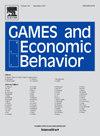The motivated memory of noise
IF 1
3区 经济学
Q3 ECONOMICS
引用次数: 0
Abstract
We propose a two-stage experiment in which people receive feedback about their relative intelligence. This feedback is a noisy message reminded at every stage, so that subjects cannot forget this ego-relevant information. Instead, we exogenously vary whether the informativeness of the message is reminded in the second stage. We investigate how this treatment variation affects the informativeness reported by subjects, and their posterior beliefs about their intelligence. We show that subjects report informativeness in a self-serving way: subjects with negative messages report that these messages are significantly less informative in the absence of reminder than with it. We also show that the lack of reminder about message informativeness allows subjects to keep a better image of themselves. These results are confirmed by complementary treatments in which we decrease messages informativeness: subjects tend to inflate the informativeness of positive messages that should now be interpreted as bad news.
对噪音的记忆
我们提出了一个两阶段的实验,在这个实验中,人们会收到关于他们相对智力的反馈。这种反馈在每个阶段都是一个嘈杂的信息,这样受试者就不会忘记与自我相关的信息。相反,我们外生地改变信息的信息性是否在第二阶段被提醒。我们调查了这种治疗差异如何影响受试者报告的信息量,以及他们对自己智力的后验信念。我们发现,受试者以一种自我服务的方式报告信息的信息量:被告知负面信息的受试者报告说,在没有提醒的情况下,这些信息的信息量明显低于有提醒的情况。我们还表明,缺乏信息信息的提醒可以让受试者更好地了解自己。这些结果得到了补充治疗的证实,在这种治疗中,我们降低了信息的信息量:受试者倾向于夸大积极信息的信息量,而这些信息现在应该被解释为坏消息。
本文章由计算机程序翻译,如有差异,请以英文原文为准。
求助全文
约1分钟内获得全文
求助全文
来源期刊

Games and Economic Behavior
ECONOMICS-
CiteScore
1.90
自引率
9.10%
发文量
148
期刊介绍:
Games and Economic Behavior facilitates cross-fertilization between theories and applications of game theoretic reasoning. It consistently attracts the best quality and most creative papers in interdisciplinary studies within the social, biological, and mathematical sciences. Most readers recognize it as the leading journal in game theory. Research Areas Include: • Game theory • Economics • Political science • Biology • Computer science • Mathematics • Psychology
 求助内容:
求助内容: 应助结果提醒方式:
应助结果提醒方式:


